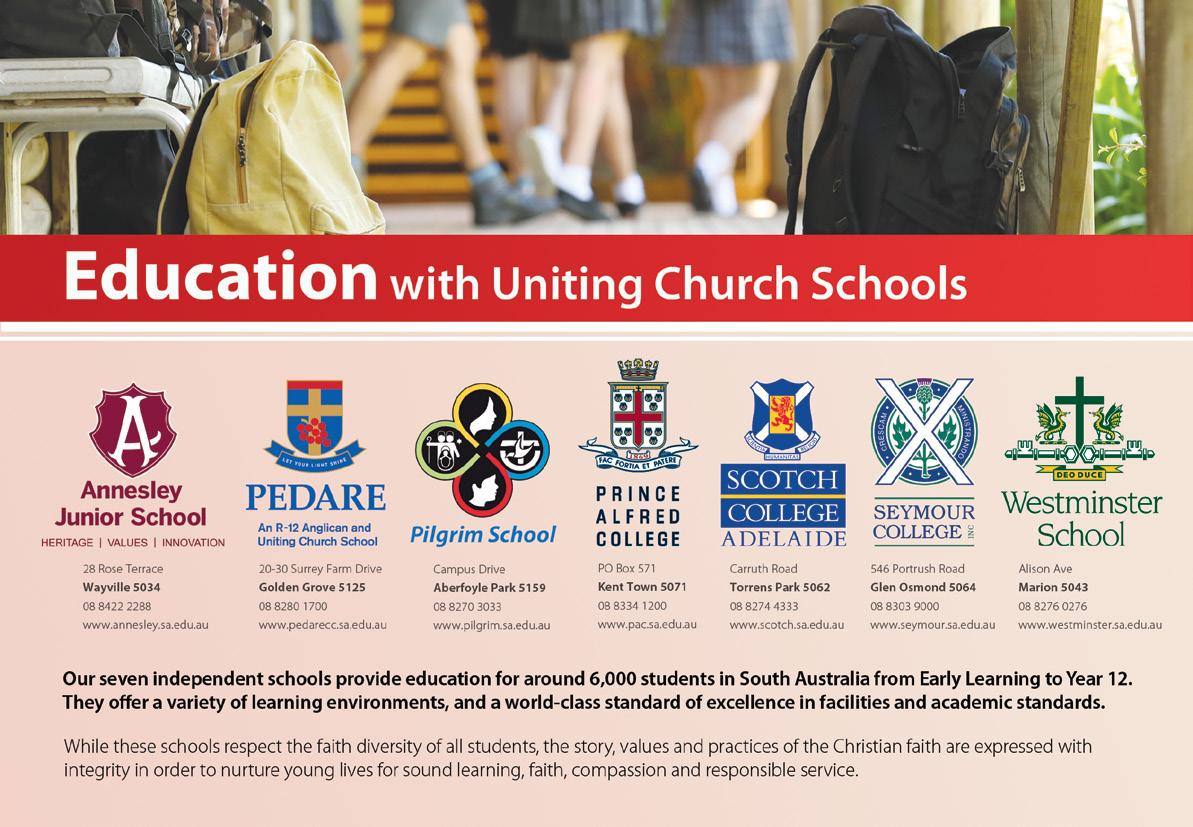
The Uniting Church in Australia Synod of South Australia October - November 2022 Issue 49 / No 5
Features
Finding Joy in the Unexpected 4
Message from the General Secretary 5
The Men's Shed 6-7
Creating an Intergenerational Ministry 8-9
Christmas Family Faith Trail 9
Arifa’s Story: A Refugee from Afghanistan 10-11
Developing Resilience Beyond Limits 12-13
The Scent of Renewal 14
Exploring Faith through Art 15 Walk with a Purpose 16
Packing Days 16
Food for the Soul 17
Emily’s Open Garden 18
A Place of Healing and Learning 19
Making Your Wishes Known 20
PoD is Alive and Well 20
Family and Faith 21
Advent is Waiting 22-23
Letter to the Editor 23
2023 Calendar 24
Regular pages
Note from the Editor 2
Message from the Moderator 3
Classifieds 25-27
Cover details: Artwork by Judy Styles, ‘Love is in the Air’.
Editor: Bridget Ransome
Advertising: Engagement Team
Design: Alex Gatley
Print: Graphic Print Group Print circulation: 7,000
For editorial enquiries:
Phone: (08) 8236 4249
Email: engagement@sa.uca.org.au
Mail: The Editor, New Times GPO Box 2145 Adelaide SA 5001
For advertising bookings: Phone: (08) 8236 4249
Email: engagement@sa.uca.org.au
The Uniting Church in Australia Synod of South Australia
Synod of South Australia
Level 2, 212 Pirie St, Adelaide
Phone: (08) 8236 4200
Fax: (08) 8236 4201
Country callers: 1300 766 956
From the Editor
A while back the ABC televised a program called ‘Old People’s Home for 4 Year Olds,’ with the premise ‘Could this encounter between young and old help transform the lives of the elderly.’ The ABC has now followed it up with the ‘Old People’s Home for Teenagers’ series. This follow on program is described as ‘… a compelling new intergenerational experiment, older adults are brought together with teenagers to see if the power of this intergenerational program can transform the lives of older people and teenagers amid an epidemic of loneliness.’
I would argue that surely these interactions would provide experience and memories that would impact both the elderly and the young? That each generation can learn something from the other and that there is meaning in the connection and the interaction.
In compiling this issue of New Times, we wanted to focus on intergenerational themes across the Uniting Church.
Melissa Neumann, Intergenerational Discipleship Developer with Mission Resourcing says: ‘If you imagine people having a meal at a dining table and a variety of different generations are rocking up, how are you creating space so that a 5-year old can sit at the table next to a 50-year old or a 15-year old? What food are you serving? What conversations are you having? How are you making space for people who aren’t a part of your community? What am I willing to give up for someone who maybe doesn’t know Jesus, or is new to following Jesus?’
Important questions to explore.
With this final issue of New Times for 2022, I would like to acknowledge all that have contributed this year and particularly the Engagement Ministry team for their tireless devotion to bringing you each issue.
Bridget Ransome Executive Officer Engagement
Contents
.................................................................................
.......................................................................
.........................................................................................
............................................................................
Return to Contents 2
Message from the Moderator

In my last article for New Times (in the June – July edition), I wrote about us as the Uniting Church looking at our future. As I gradually return from an extended period of leave, I look forward to continuing to engage in conversations about the future of our Uniting Church, both on a national and local context.

I am grateful for the on-going support of the Ex-Moderator, Rev Sue Ellis and many others over the last few months and thank you all for your prayers over this time. I have been reminded of the importance of community in our journey as God’s people together.
As we continue looking to the future, as the Uniting Church in South Australia, we are thankful for the many areas of active mission and ministry exhibited by the people of our church, some of which are highlighted in this magazine. Many individuals and groups work hard to show God’s love, care and concern to others. I was thankful to play a small part in the activities of the Red Dove Café during the Royal Adelaide Show, and it was encouraging to witness the camaraderie of the volunteers and the ways in which they showed God’s love to those around. Their award for Best Fixed Food and Beverage Outlet at the Show was well deserved, and members of the committee are already thinking about next year and how they might continue to improve on and grow this opportunity.
Organisations such as the Red Dove Café, along with Schools Ministry Group, Frontier Services Outback Links, Emergency Relief Centres and many other activities within and outside of congregations provide opportunities to work together in significant ways, serving and sharing the good news of God’s love. Each of us, lay and ordained, are called to do this in different ways. As it says in paragraph 13 of the ‘Basis of Union’ ‘… the one Spirit has endowed the members of his Church with a diversity of gifts and that there is no gift without its corresponding service.’ It is encouraging to see the variety of ways in which people’s gifts are exercised in service. God’s mission in the world needs us but it is never dependent on one person or in one place. We each have a part to play, supporting each other as we work together as the body of Christ. Another of the ways we work together is through our partnerships with sister churches in other countries. The 30th anniversary of our partnership with the Presbyterian Church in the Republic of Korea, Iksan Presbytery, will be acknowledged in coming months, and a number of people from the Uniting Church in SA will travel to Korea to join with their celebrations.
The church congratulates Vicky Balabanski both on being appointed Principal of the Uniting College and being awarded a professorship by the University of Divinity, our new Higher Education Partner. Vicky has been in Placement at the Uniting College for Leadership and Theology for many years, and we are fortunate to have academic staff with such experience and knowledge to teach and lead us. The Synod is grateful for the close relationship we have with the Uniting College.
As we consider the variety of ways in which we can offer ministry and service to others, I would like to acknowledge the many years of service of the Ministers and Lay Preachers recognised at the recent Celebration of Ministry Service. As well as recognising those recently retired, it was an opportunity to celebrate milestones in ministry of up to 70 years since ordination. Truly a lifetime of active service! We are grateful for the commitment, faithfulness and love shown in so many ways.
Bronte Wilson Moderator
... activities within and outside of congregations provide opportunities to work together in significant ways, serving and sharing the good news of God’s love. Each of us, lay and ordained, are called to do this in different ways.
Return to Contents 3
Finding Joy in the Unexpected
by Rev Sue Ellis (Ex-Moderator)
Into uncertain and fearful times, good news brings great joy.
It is the announcement of the angels to humble shepherds going about their ordinary lives in unsettled times. It is the birth of a new King – the baby Jesus – born in a humble stable.
The arrival of any new human herald’s great joy and an anticipation of this new life bringing welcomed changes and new insights. Every human life brings a gift from God to the world. A gift of joy. A gift of love. A gift of new wisdom and capacity for goodwill.
Luke
The birth of Jesus is a gift of good news for all people. Every time Jesus is invited to reign in a human heart, life is transformed with unexpected joy and made ready for worship and service to King Jesus.
In 2022, South Australians proclaimed a new King –King Charles III, who is also the Supreme Governor of the Church of England. The proclamation of the new King came in the midst of the deep mourning for Queen Elizabeth II. At any time of grief and loss, the future can appear unsettled. As King Charles III moved among grieving people, many spoke of being comforted and assured by his presence and felt confident that through his reign, all would be well again. His coronation will be a time of great joy breaking into ordinary life as the new era of his reign is celebrated.
The angels tell us the good news of a new King born in Bethlehem who is good news for all people, including King Charles III. Jesus brings us all great joy, when his love, mercy and justice break into our lives whenever they become afflicted with grief and loss and uncertainty.
We all know these times, because together we have experienced the COVID-19 pandemic. Together, we are addressing our lifestyles to limit the effects of climate change and bring great joy to all creation. Now, we need not fear. We hear the bells ringing out the good news of a new King – Jesus – born anew at Christmas.
Do not be afraid; for see—I am bringing you good news of great joy for all the people.
Unexpected joy bursting in Birthing new beginnings Creating love Renewing life All will be well God is here.
2:10
Return to Contents 4
Message from the General Secretary
It seems odd writing about the Moderator’s Christmas theme, for I am writing this some time ahead of Christmas. The theme is connected with one of the most ‘Christmassy’ of scenes in the gospels, told in Luke’s gospel, an angel appearing to the shepherds and announcing ‘Good news of great joy for all people’ and then a multitude of angels appearing and singing praise to the glory of God.
Words and images that are picked up in songs and hymns, Christmas cards and great works of art. The shepherds respond by going to Bethlehem to see for themselves what the angels have proclaimed.
The gospel of Luke and its companion piece, the book of Acts, are extraordinary works of narrative theology. At the heart
of the birth narrative is Mary, who Luke holds up as an exemplar of discipleship. When the shepherds come to Bethlehem and tell their story of angels announcing good news of great joy, the crowds are amazed, but Mary we are told ‘treasured all these words and pondered them in her heart.’ (Luke 2:19 NRSV)

Being amazed is a good thing. A sense of wonder is life giving. It keeps us growing, nurtures our spiritual life. But Luke seems to be suggesting that it is not enough. Mary does more than just wonder, she treasures the words, and she ponders them in her heart.
There are a range of spiritual disciples and Christian practices that are designed to help us notice, treasure and ponder what God is up to in our lives and world. Almost every renewal movement in our history, including most monastic movements, the Protestant Reformation of the 16th century and the Evangelical Revival of the 18th century have some practices to help us learn to stop, listen, treasure and ponder.
On the board in my office I have two lists of practices from different writers to

remind me of some of these disciplines. (One list is from Samuel Wells and his book ‘Incarnational Ministry’ and the other is from Methodist scholar Elaine Heath when she did a presentation for our team in the Synod Office.)
Both lists have similar starting points of showing up, being present and paying attention. In a world that can be filled with distractions these moves are not so easy. It takes practice to be present to yourself, to other people and to God. It takes practice to stop and pay attention to what is in front of you. And then not to forget but to ponder what you have noticed. People have written much on this, entire books.
My encouragement as we enter another Advent Season, as we celebrate good news of great joy, is that we pause, be present and attend to the grace and joy that God is bringing into our midst.
Philip Gardner Interim General Secretary
Return to Contents 5
The Men's Shed
by Peter Jones
The bike shed at the Blackwood Uniting Church started more than 20 years ago; but not in its current manifestation. As a part of the Blackwood Uniting Church Community, we started working out of a shed at the rear of the Belair Uniting Church where the group continued until mid 2021 when we moved to the Blackwood Uniting Church because we had outgrown our first home.
Originally established by the minister of the day who saw a need for activities that targeted the retired men of the congregation and surrounding district. There were many classes or groups within the church offering programs or activities for all people but mostly these were adopted by women. A need was identified for something specific for the men and a ‘men’s shed’ evolved.
When I joined the group about five years ago there was a very strong if not exclusive focus towards refurbishing bicycles for people in need. Bicycles were customised to be donated to Aboriginal Communities; some were made available to the victims of bushfires; whilst others were given to children in need.

In some respects people approached us looking for help and the limited number of requests made for a simple morning with long morning teas – life was good and easy. A ready supply of bikes was not an important consideration and at times there were three people at a single workstation working on a single bicycle. Supplies were limited but not a critical issue or a problem – we could always have a longer morning tea and in many respects this is what a men’s shed is all about; community, fellowship, generosity and a large amount of chinwagging!
As we attracted growing requests for assistance our world began to change. Our reputation for helping expanded and resulted in greater media coverage. The local newspaper, 'The Blackwood Times', has always been a huge supporter and this led to wider knowledge of our activities and so the ball started to roll.
Little did we know about stopping rolling balls that had gained momentum! Live radio interviews were broadcast and other newspapers ran stories about us. The inevitable occurred and donations started to increase. COVID-19 and lockdowns however prevented us from coming together and working on bicycles, but they did not stop the donations from continuing. This caused friction with our existing location and we rapidly grew to the point where larger storage and workshops were needed, prompting a move to the Blackwood Church.
The move to Blackwood has been incredible. We have been welcomed by the wider community of the district and our proximity
Return to Contents 6
to the roundabout and walk past foot traffic has also served to increase our profile.
The poor church office manager and her team of volunteers are constantly fielding questions from people looking for more information about the bike shed, opening times and how they can drop off bikes. We have become a part of the local scene in Blackwood.
New avenues of groups to donate to such as some primary schools in very disadvantaged areas, the Australian Refugee Association (domestic) and Containers of Hope (international) have driven our image to the level where ABC News ran a story on us on the evening news service nationally. This has been picked up by other broadcasters and we have been contacted by groups such as Bicycles for Humanity, an international organisation assisting people in need and Planet Ark featuring us as an example in recycling for the good of the planet. The University of South Australia has invited us to partner with them to supply and customise bikes for a program to get people back into cycling – and all we do is fix bikes!
Recently Containers of Hope collected 46 bikes from us and it was this event that was captured by the ABC media. The smiles on the volunteers' faces were hard to miss and it was a pleasure to see the results of so much hard work being taken away.
More recently a convoy of volunteers with trailers delivered 54 bikes to the Refugee Association in Salisbury, and to watch the faces of children light up when receiving a bike is the reason we do it.
The University of South Australia also recently collected 8 bikes to commence their program to get people back in the saddle!

Generally on an open Monday the public will walk in and look over our bicycle collection displayed in the church hall. Some come looking for a bike for themselves and some for growing families or friends. We do not try to undercut or outdo the cycle shops because they are our friends and they support us as well but we try to help people in need. We donate bikes to them and if in a position to do so they make donations back to us. Sometimes quite substantial –what goes around comes around.
I would also be most remiss if I did not say that we continue to exist only because of the generosity of the community. We acknowledge the church and their committees and volunteers; the people of the wider community who donate unwanted bikes to us; and we acknowledge the support from other organisations such as the local Lions who supplied us with specialised tool kits. The neighbouring Church of Christ who donated the entire proceeds of a fundraiser to us and the local cycle shop who do wonderful pricing on parts and even technical assistance when we are constantly out of our depth – without all of them we cannot exist.
There is so much more we could do and we want to do. A new workshop has been commissioned and eventually a shed will emerge from the ground when all the government bodies have completed the paperwork they thrive upon. We are truly grateful for the efforts of all around us who support us.
More recently a convoy of volunteers with trailers delivered 54 bikes to the Refugee Association in Salisbury and to watch the faces of children light up when receiving a bike is the reason we do it.
Return to Contents 7
Creating an
How are you making space for people who aren’t a part of your community? What am I willing to give up for someone who maybe doesn’t know Jesus, or is new to following Jesus?
Intergenerational Ministry, as defined by theologians Holly Catterton Allen and Christine Lawton Ross, can be seen as ‘a congregation intentionally [bringing] the generations together in mutual serving, sharing or learning within the core activities of the church in order to live out being the body of Christ to each other and the greater community.’
Melissa Neumann and Tim Littleford aid the Uniting Church in living out this concept through various ways, keeping both young and old engaged with their congregations and nurturing them on their faith journeys.
Intergenerational Ministry
Melissa Neumann noticed that in the last decade, a global shift sparked and led by children and family ministry had started to occur in churches nationwide.
Having worked in children and family ministry before entering her current role as the Intergenerational Discipleship Developer at the Synod of South Australia, she was deeply interested in the research surrounding intergenerational ministry.

‘The research and the stories of seeing young people grow as disciples and remain in the church often is because children and young people are equally involved in the life of the church. There may still be age specific programs and spaces, but there’s that sense that children and young people are welcome and they have a place and a voice, so young people are more likely to stay [involved in the church],’ said Melissa.
Adults and older people also benefit from an intergenerational environment, building relationships with people in the church of various ages through group prayer, sharing experiences and engaging together in discipleship practices. That doesn’t come without challenges, but Melissa is passionate about aiding
by Emelia Haskey
TimLittleford
congregations in that culture shift towards an intergenerational ministry.
At a recent conference on the subject, she noted the use of what’s known as the Dining Table model.
‘If you imagine people having a meal at a dining table and a variety of different generations are rocking up, how are you creating space so that a 5-year old can sit at the table next to a 50-year old or a 15year old? What food are you serving? What conversations are you having?
How are you making space for people who aren’t a part of your community? What am I willing to give up for someone who maybe doesn’t know Jesus, or is new to following Jesus?’
The COVID-19 pandemic has halted some churches from moving towards an intergenerational model, but it has also made many people crave community, with services that cater for both young and old providing a sense of active participation.
‘In services when all ages are present there is a sense of joy and laughter and energy … not many people can sit quietly for sixty minutes, whereas these services engage all

MelissaNeumann
Return to Contents 8
the senses. Sometimes we forget or place little priority on younger people and we are seeing the consequences of that. Not every church has to have kids and families, but we should all be thinking - how are we being a community of disciples?’
Tim Littleford had been attending church since he was a child, but after seeing several friends come to faith in high school, he knew that he felt a calling to encourage more young people to have a transformational experience with God.
‘I had my own experience with God growing up in Church that really affirmed to me that God was real and there … I saw some friends have a complete 180 [through coming to faith] and that really lit a fire under me,’ said Tim.
After finishing school and getting involved with youth and family ministry – including starting a youth group in a country town where young people are often isolated –Tim felt a call to ministry alongside his wife.
The role of Intergenerational Discipleship Developer was a perfect fit for him, providing support to youth ministry leaders to aid them in discipling young people.
‘I saw an opportunity in this role to try and help youth ministries work with one another and problem solve together.’
‘Out of COVID-19, we’ve started to run more training sessions, and trying to be led by people who are running youth ministry around what the areas of resources and training that they need to feel more equipped and more confident.’
Tim has also put together a youth development team, consisting of a handful of leaders in youth ministry from across the Synod who have come together to work on raising the bar around how we are discipling young people.
He hopes to create a trickledown effect, where leaders can encourage young people to not only grow in their faith, but become future leaders themselves in their own congregations and communities.
As for the future of youth and family programs within the Uniting Church in South Australia, Tim prefers to look at the bigger picture.
‘The best thing we can do for our youth is grow more disciples and leaders … especially looking at how we can be resilient and put our faith and trust in Jesus despite our circumstances.
My hope is for renewal. I think the way we run ministry will probably have to change as the church changes, but what I’m seeing is that there is a generation of young people that God is raising up who will take the mission of God forward in South Australia.’
You are invited to explore the events of the Christmas story through five interactive stations across the four weeks of Advent. Each station has a theme, Bible passage, questions to chat about, activity ideas for different ages including adults, and prayer ideas that use locations and items from around the home.
This is a great opportunity to grow faith at home for people of all ages, particularly families with children under 12. It is hoped that this resource will equip your family to play, talk and pray together so that you may grow in faith, especially as you celebrate the birth of Jesus, God’s great gift.
Find the resource and an information letter for church leaders that explains the various ways a church can use the Christmas Family Faith Trail resource to bless and encourage families and small groups of all ages to grow in faith formation at home.
https://sa.uca.org.au/intergen/family-resources/ For additional Intergenerational resources please visit: https://sa.uca.org.au/intergen
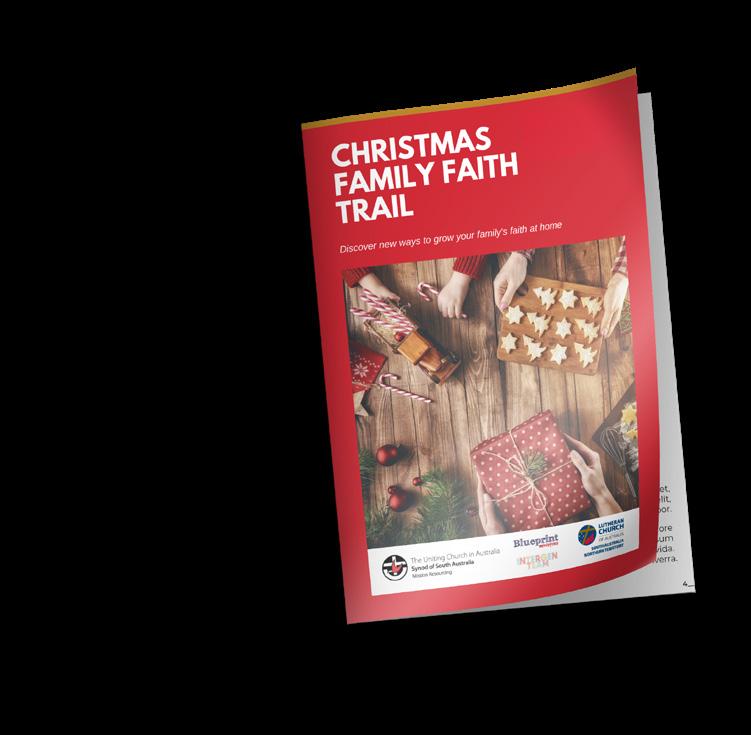
Christmas Family Faith Trail
The best thing we can do for our youth is grow more disciples and leaders … especially looking at how we can be resilient and put our faith and trust in Jesus despite our circumstances
I saw an opportunity in this role to try and help youth ministries work with one another and problem solve together.
Return to Contents 9
Arifa's Story: A Refugee from Afghanistan
by Emelia Haskey

Every year on the 13th of August, Arifa Barekzai celebrates the day she arrived in Australia, having fled from Afghanistan as it came under the control of the Mujahideen, and later the Taliban. This year marks a poignant anniversary – it’s been twenty years since she escaped.
‘I celebrate it every year as if it was my birthday. It was my new life. Everyone who comes here will have a new life – especially women,’ said Arifa.
She was born in a small village in Afghanistan in 1961, originally raised by her father and stepmother before embarking with her sister’s husband – a high ranking police officer – to travel and study at different schools all around the country.
Arifa was bright, other students used to beg her to do their homework for them. By the time she had finished her final year of high school, she applied to study at the Stavropol State Pedagogical Institute in Russia to complete a Diploma of Russian Language and Literature in 1984.
However after returning to Afghanistan and working as a Russian interpreter in 1988, the country grew more and more unstable, and by the time Russia had ended its invasion of Afghanistan, civil war had broken out. As an educated and modern woman, Arifa was targeted by the Mujahedeen.
‘As women we faced lots of penalties … we couldn’t wear skirts or sleeveless shirts and many times men with guns came to my house to try to get me to marry one of them. In front of me I watched people die – one rocket hit a place near us – all the houses were full of human bodies. I saw a child hanging from a tree. Every time I go to sleep my eyes close and I remember that child.’
In 1992, Arifa, with her brother’s widow and her son realised it had become too dangerous to stay in Afghanistan, and they fled their home, crossing the border on foot into Pakistan where they ended up living for the next decade.
This was not without difficulty. They were often stopped and harassed by police about their visas, and struggled to make enough money to survive. It was by chance that Arifa discovered a way out of Pakistan.
‘We went to do some food shopping and the shopkeeper suggested we line up to apply for this [refugee] visa. So we went to the visa office at midnight … we waited until nine o’clock in the morning because of the big queue. We went together but they didn’t accept us together – their visa was rejected, but mine was accepted to go to Australia. But I couldn’t tell them – I escaped. It was confidential, only a few friends and neighbours knew.’
On the plane to Australia, Arifa cried for the entire journey.
When she arrived in Australia, she was placed in Anglicare accommodation under the care of the Migrant Resource Centre. The centre staff gave her the nickname ‘the crying lady’ – whenever they asked her how
I celebrate it every year as if it was my birthday. It was my new life. Everyone who comes here will have a new life –especially women.
Return to Contents 10
she was, she started crying. She eventually became a volunteer for the centre, helping other Afghan refugees settle into Australia.
‘It gave me a little bit of power – it gave me confidence, that I could do some things.’
Starting work as a translator and moving into public housing gave Arifa some stability, as she slowly began to make friends and adjust to life in Australia. The memories of her past loomed over her, but a fragile peace had arrived in Afghanistan, and she was able to visit and reunite with her family members. Her favourite memories are of those times. When Afghanistan fell to the Taliban last year, her world was once again shattered.
‘I didn’t sleep for a week. I was walking around all night. I made mistakes with my job, I was a mess. I feel sorry for those with knowledge, and talent and education, because Afghanistan is gone. I have three girls over there – two nieces and my grand-

niece. They cannot study or work, their family is looking after them so they do not kill themselves. I am talking with them until two or three in the morning, because they are scared that one day one of the Taliban will come to the door and ask them to get married.’
Her grand-niece is an avid drawer, and has been documenting the situation in Kabul through her art. The Taliban recently raided the house and destroyed all of her work, and attacked her father in front of


his family. This is the everyday reality for people living all over Afghanistan.
When asked what her hope was for this article, Arifa was clear.
‘I would like everyone who reads this story to put their hand up to help girls in Afghanistan. They have no income, so financial help is best. Everything is two or three times more expensive. Anybody can sponsor [someone from Afghanistan] to come here. This will give them another life.’
Arifa dreams of being able to bring her nieces and grand-niece to Australia to live with her, but has struggled to achieve that dream. She worries she will eventually have to stop working soon because of the toll on her body, even though much of the money she makes is all sent to her family in Afghanistan.
By telling her story, her cry for the people of Afghanistan will not go unheard.
It gave me a little bit of power – it gave me confidence, that I could do some things
Arifa Barekzai
Return to Contents 11
Developing Resilience Beyond Limits
by Emelia Haskey
Established in 2012, Beyond Limits Outdoor Education was created as part of Uniting Venues South Australia to provide team building and educational activities in the great outdoors for school students. With programs hosted at Adare (Victor Harbour), Nunyara (Belair), Deep Creek, and more, students can engage in programs on social justice, Aboriginal studies, or simply head out on an expedition.
Brendan Noonan, the Program Manager for Beyond Limits, says the outdoor retreats are an important part of helping young people develop life skills.


‘Each program is tailor-made to each school’s requirements – we might work with the students on a year 12 retreat, or we might work with the same students every Monday for ten weeks, which then culminates in a 3 day overnight camp at Deep Creek,’ said Brendan.


Return to Contents 12
‘We focus on communication, participation and encouragement. During the program, teachers get to see students outside of their normal environment, and as far as relationship building – the bus rides and camp set up – we compact a whole term of interactions into a short period.’
Building resilience and a willingness to step out of their comfort zones are a major part of every camp, with students encouraged to work together to solve challenges and complete activities.
‘Encouraging them to find the solutions themselves in groups – we use the term “facilitators” rather than instructors or guides – is really important. We also undertake debriefs to see how what happens at camp can play out in the real world.’
All of the work provided by facilitators and leaders at Beyond Limits is undertaken with the spirit of Christian hospitality, which underpins the mission statement of the program. This includes taking on volunteers such as university students and young adults as guides for school students.
‘When you get to that university and early twenties age, a lot of young Christians feel lost, and coming into that supportive environment (being guides) can be very grounding.
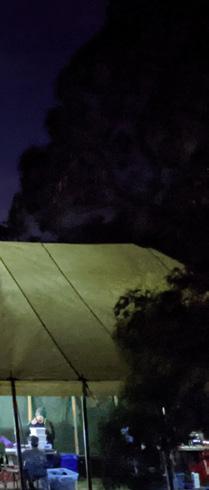
Jesus accepted all people and loved all people, and that’s a big part of what you do in life. We are one of the parts of the Uniting Church that has the most interactions with people who aren’t religious. We don’t preach to state schools, but through our actions and what they see of us, they are able to experience Christian hospitality.’

Jesus accepted all people and loved all people, and that’s a big part of what you do in life. We are one of the parts of the Uniting Church that has the most interactions with people who aren’t religious.
Return to Contents 13
The Scent of Renewal
by Rev Dr Tim Hein
They say the scent of renewal is the smell of rain and there is significant renewal occurring at Uniting College for Leadership and Theology (UCLT). After what has clearly been a difficult 18 months of unprecedented and challenging change, the scent of renewal is growing stronger.

The ‘Basis of Union’ refers to renewal as the ‘end in view for all creation,’ something the church is called to serve. Sometimes we are, and other times it visits upon us.
In April of this year I commenced as Executive Officer for Mission and Leadership Development, and I can’t think of a more important time for us to

be engaged in substantial mission and leadership development. We need to think deeply and reach widely.
The mandate of UCLT calls us to educate and develop life-long disciples and courageous leaders in order to help the church enter more fully into God’s mission. There is no more worthy cause than alerting the world to the good news of Jesus Christ. Through our words and our deeds, our culture needs the gospel of God’s grace for renewal.
In August Vicky Balabanski commenced as our new Principal. We have been colleagues and friends for over a decade, and are working together using our gifts in ways that complement one another in the renewal of Uniting College 2.0! Already a world-class biblical scholar, Vicky was this month awarded full Professor status.
At the start of September we announced that we have joined the University of Divinity. This is a significant step in enabling
the very best higher education accreditation for our students. We are also well advanced in planning for a new faculty team, and our formation program for ordination candidates is being totally renewed. And there is much still to come.
In all this, alongside our courses in biblical studies, theology, discipleship, and ministry practice, there are several key elements guiding our process:
Our distinctive approach in teaching leadership
A stronger missional focus, with new units
Transformative formation for candidates, raising the experience, engagement, encouragement and expectation, and building necessary resilience
Accessible training, including workshops, conferences, masterclasses and courses for the whole people of God
Gospel renewal, for if we are to participate in God’s mission – the renewal of individuals, congregations, communities and creation – then we ourselves must be ready to allow the Spirit to renew our own personal lives through the gospel.
We are totally committed to the renewal of Uniting College for Leadership and Theology, not for its own sake, but to train, equip, and resource the whole people of our Synod and beyond, in the courageous path of renewal that is participation in the mission of God.
Rev Dr Tim Hein and Rev Prof Vicki Balabanski
Return to Contents 14
Exploring Faith through Art
by Emelia Haskey
Nina always knew she felt a call to ministry.
Having grown up at Henley-Fulham Uniting Church, as a teenager an opportunity to run a children’s ministry group came her way –she jumped at the chance.


Taking on the responsibility of engaging children and young people in faith, she found a passion for building connections and community with young people. By the time she had finished her university degree in visual arts, she had worked in youth ministry at both Henley-Fulham and Lefevre, before being hired as The Corner’s Youth Minister.
‘I’ve always felt it really amazing to give young people safe spaces and community to talk about God and I feel very honoured that I get to do that,’ said Nina.
‘When I worked at Lefevre I was working with children who didn’t have a faith background, so we got to talk about the basics of faith. At The Corner, I’ve been creating spaces for LGBT+ and neurodivergent people to feel welcome. It’s always given me life and passion – it’s hard yet incredibly rewarding.’
Working closely with the former minister of The Corner, Rev Mark Hewitt, she developed the Blank Canvas youth program as a way of exploring faith through art.
The program involves group discussions before and after art activities, which have included hand dying t-shirts, painting tote bags and self-portraits, folding origami and messing around with modelling clay.
Having now been running for so long, some of the middle school students who started in the program when it was first created now make up half of young adult leaders.
‘With Blank Canvas I was trying to create something that wasn’t offered elsewhere … as humans we process things in different ways, and art can be a helpful tool to help us think deeply about our faith. For us art is not about the end product, it’s about the process you go through in creating it.’
But being a Youth Minster doesn’t come without challenges, as the program’s value and viability has been called into question as it differs from typical youth group spaces involving Bible studies and music groups. During the COVID-19 pandemic, being able to run the program online was integral for Nina to be able to provide support –especially when it came to answering hard questions.
‘We don’t shy away from difficult conversations – we’re open for any questions or discussions. We try to build that culture so our young people know they can talk to us about anything. They are trying to figure out their world and those conversations are really important.’
The Blank Canvas program has also inspired programs for young people who have aged out of the youth group, such as ‘Evenings at The Corner’ – a monthly evening and meal service for families, as well as the creation of a young adults group.
Surfing the tide of change has been key to keeping Blank Canvas relevant and fun for the young people that attend, and Nina has embraced how the program has blossomed.
‘We’ve created a space where young people get to be themselves and feel safe, and it’s such a joy to see that.’
L-R: Helen Hollow, Matt McAllister, Lucy Greagin, Adam McAllister, Nina Luscombe, Marcus Falckh
Return to Contents 15
Packing Days Walk with a Purpose
For several years now Westminster School has added to the collection of donated goods and clothing for Uniting Church Packing Days. Previously, organisers at the Marion Uniting site came after Westminster’s Annual Fair and gathered what was useful for northern and remote communities from the unsold clothing store. However, COVID-19 limitations meant that for the past three years, Westminster has been unable to proceed with that event.
So this year Chaplain Rev Phil Hoffmann put the word out to the Westminster community as a population of the wider Uniting Church requesting donations of quality used clothing. In preparation, Phil then dutifully lined up ten labelled packing boxes along the eastern wall of the Chapel for donations.
On Friday 9th September 2022 the Westminster School Chaplain, Rev Phil Hoffmann, joined by 70 staff and year 11 and 12 students, walked to school – a three hour 14.6 km trek from Henley Beach to Marion. So as to arrive at the beginning of the school day, this meant a 5:30am start!
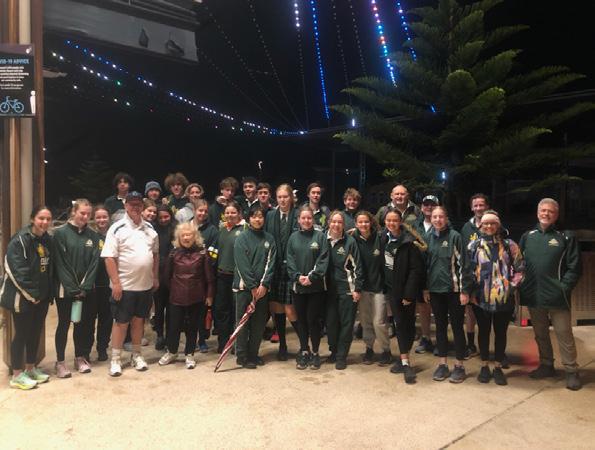
The walk to school was in support of a project to build a local school in Tanzania, Africa. In 2013 Senior Geography Teacher, Adam Burford, visited the village of Kiserian as part of a sixmonth volunteering trip. There he discovered that children aged 5 to 12 were walking 13 kilometres daily – both ways – to get to the nearest Government-provided school. The journey was perilous, subject to wildlife, falls and other dangers. The requirement to travel this distance also drastically reduced the hours of the school day.
The School Leaders at Westminster got behind this idea and made ‘Walk with a Purpose’ a major fundraiser for 2022. Families and the extended community of Westminster were invited to give a donation in support of the walk and to join in an international effort to extend the educational privilege that Westminster offers. In the afternoon of that day students of the junior school participated in their own 1.6km walk around the school’s ovals as their involvement.
Such initiatives fulfil Westminster’s emphasis as a Uniting Church school with an emphasis on service. At a recent assembly, Principal Simon Shepherd highlighted to students that their education should provide ‘Opportunity to become a better person, and that includes making your contribution.’
The response was quick and overwhelming and, as can be seen in the photograph, soon those boxes were filled to overflowing and donations were lining the western wall as well!
One Westminster family involved in a local pharmacy chain added 7 cartons of brand-new valuable footwear – thongs! In the end, over 20 cartons were filled and transported to Marion for the sorting task over three days in June. Westminster Boarding students also gave of their time to volunteer to share that task.
Given the age profile of the Uniting Church, a challenge for Packing Day organisers in recent years has been that many of the donated goods are elderly people's clothes. Westminster was glad of the opportunity to add children’s and young people’s clothing, shoes, books and stationery to this year’s supply.
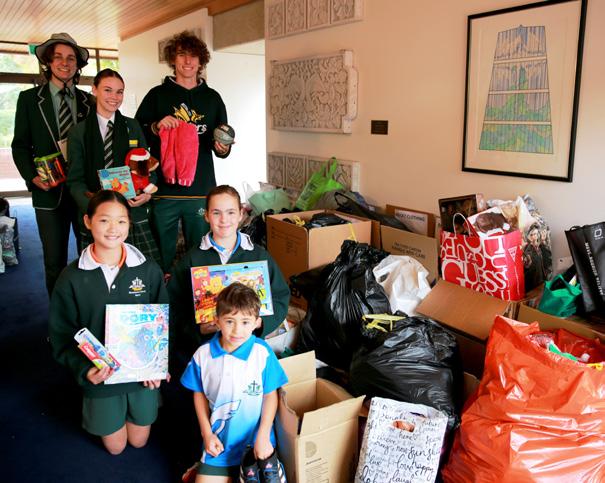
Return to Contents16
SALA Art Exhibition 2022 at the Red Dove Café
The Food for the Soul Art Exhibition was officially launched on August 31st at the Red Dove Café at the Royal Adelaide Show.
Food for the Soul is an Art Poster display by original artists that speaks to the resilience and hope that rural people exhibit in their daily lives, qualities of the soul that encourage all people and bring joy.
It has been organised by the Uniting Church Fellowship and Mission Support group, of which the Red Dove Café team form part.
In bringing the exhibition together, the aim was to bless and inspire café patrons as they rested and shared food together within the café setting.
Rev Sue Ellis, Acting Moderator, opened the exhibition by thanking the organising team that worked with her on this art project, including Judy Styles, Raylene Pearce, Janet Woodward, Rev Ruthmary Bond and Jenny Esots.

Thanks were also given to the artists who responded to the call for art-works, many who were in attendance at the opening. Artists: Ron Woodford, Jenny Esots, Judy Styles, Louise Johnson, Yvonne Latter, Karen Greenhaigh, Trevor Hancox, Pat Williams and Raylene Pearce.
Rev Ruthmary Bond acknowledged the hard work of all at the Red Dove Café which has had an inspiring tradition of hospitality at the Royal Show for over 65 years.
Royal Show Site Organiser Grant Piggot acknowledged the long association of the Red Dove Café with the Royal Adelaide Show and noted this was the first SALA Exhibition at the Red Dove Café and also the first at the Royal Adelaide Show. Grant was pleased to officially open the exhibition.
Mark Schultz, Team Leader of Mission Resourcing at the Uniting Church noted the support provided by Mission Resourcing for this project and commended all those who were a part of the project.
Visitors and organisers of this project set up and opened the exhibition prior to the Royal Adelaide Show’s opening date, so high visibility jackets were the order of the day onsite as per safety protocols. During the official opening time security staff looked after the supply of high vis jackets and in return received afternoon tea from the Red Dove Café staff. Another story of hospitality from this generous and hard-working team.
The Exhibition ran from Saturday, September 2nd until September 11th, 2022.
L to R: Rev Ruthmary Bond, Rayle Pearce, Judy Styles, Rev Sue Ellis, Janet Woodward and Jenny Esots
Return to Contents 17
Emily's Open Garden
by Marisa Elks
In 2011 a small group of volunteers from Sunset Rock Uniting Church travelled to Bukit Karmel Orphanage in Bogor Indonesia to provide assistance with building maintenance, activities for the children and to help care for the babies. Later that year, the entire congregation organised ‘Emily’s Open Garden’ at the home of Chris and Emily Giles to raise funds for Bukit Karmel as well as Hohidiai Medical Centre on the remote island of Halmahera in Indonesia. Over 1,000 people attended the event and over $20,000 was raised.
Since then Sunset Rock has had two more open garden fundraisers and two more working bee visits to Bukit Karmel and one to Hohidiai. This November after a four year hiatus due to COVID-19, Sunset Rock will run ‘Emily’s Open Garden’ again to further support these two very worthy Indonesian causes.

Emily’s garden in the Adelaide Hills is a ‘must see’ for any gardener interested in landscape design and unusual plants, and particularly for rose lovers. It boasts an extensive rose garden with around 500 standard, bush and climbing roses terraced on either side of a sweeping stairway that lures you from the front of the house to a lawned gazebo area. Emily is a rose collector so the variety is stunning.
The long gravel driveway winds its way to the house and is lined with camellias and rhododendrons. There is an impressive solar powered waterfall, feeding a small stream that winds its way to the dam where the native ducks enjoy a splash. Other features include a cottage style garden, a native garden walk and a tree collection that includes two rare heritage trees. For those who have seen Emily’s garden before, there are new garden features such as a stone rotunda reminiscent of Roman architectural style.
The 6 hectare garden is situated at 89 Milan Terrace Stirling and will be open on the 5th November from 10.00 am – 4.00pm and on the 6th November from 11.00am – 4.00pm. There will be continuous live musical entertainment in the rotunda and food, drink and barista coffee available for purchase. Plants, home baked products, preserves and other goods will also be for sale. Admission is $10 adults and children are free.
Emily’s garden in the Adelaide Hills is a ‘must see’ for any gardener interested in landscape design and unusual plants, but particularly for rose lovers.
L to R: Esther Scarborough (from Hohidiai) and Emily Giles
Return to Contents 18
A Place of Healing and Learning
by Bek Brown
After attending the premiere of the film 'Colebrook Reconciliation Park: A Place of Healing and Learning,' I was struck by the fact that this was not some story that happened somewhere else, but something that happened and still exists in my community. I wanted others to know about it because it's an important story - one that needs to be told, heard and shared. With that thought, I organised a screening at our churchBelair Uniting. My daughter and I did a letter box drop to the surrounding neighbours and I posted an invitation on our local Facebook page. We also put on soup and rolls as part of the event.
We were thrilled to have almost 60 people in attendance. Many of whom had grown up with kids from Colebrook! Several members of Blackwood Reconciliation Group (BRG) also came along – including the Mayor of Mitcham, Heather HolmesRoss. Although it wasn't a fundraiser, people generously gave to the work of the BRG, raising $300 to help with upkeep of the Colebrook Reconciliation Park in Eden Hills.

The film is not easy to watch – it details the removal of 350 children from their families and the pain that was inflicted especially on their mothers. But, if we are to have true reconciliation in Australia we must first be willing to hear and sit with the truth of what First Nations people in this country have endured and continue to endure.
The film is also a story of hope for the future and how we might truly walk together as Indigenous and Non-Indigenous Australians.
That is something that we are committed to at Belair Uniting and from the turn out we had, I would say that it's also something that our community cares deeply about. You can watch the film at: https://www. colebrookreconciliationpark.com.au/film.html
... if we are to have true reconciliation in Australia we must first be willing to hear and sit with the truth of what First Nations people in this country have endured and continue to endure.
Return to Contents 19
Making Your Wishes Known
The Barmera and Berri Uniting Churches gave a gift to their Riverland community when community conversations were offered about the end of life and some of the matters that need to be considered. Rhonda Smedley, from the Walkerville Uniting Church, was the facilitator of the Making Your Wishes Known workshops and this was the first time she had presented one of these sessions in a regional location.
Participants appreciated the professional booklet Rhonda provided and the opportunity to investigate practical, emotional and spiritual issues around end-of-life choices as well as looking at Advance Care Directives.
PoD is alive and well!
by Max Howland
PoD – Period of Discernment
– is alive and well in South Australia.
At the recent meeting of the Presbytery of Southern SA (PoSSA) there were presentations by two people completing a Period of Discernment, and all three Presbyteries have people in the process.

A Period of Discernment is a space of time when a person gives some intentional and deep thinking to discerning what call God might be making on their lives for the next little while (or maybe longer!). It is something that is applicable to any person at any stage of life; it may lead on to the pathway to ordained ministry, or it may lead to a continuing lay ministry.
The presentations made at PoSSA demonstrate that perfectly: Jenny Esots has discerned a call to ordained leadership within the Church; Aafke Boomsma has discerned a call to Lay Ministry, in particular exploring the boundaries of new expressions of faith.
Currently engaged or about to start in PoD:
• Generate: seven candidates, with twelve others recently completed
• Southern SA: four candidates, with two recently completed
• Wimala: four candidates engaged in the process.
The PoD teams of the three presbyteries commend the process to all our members. It is particularly well-suited to
those navigating a transition in stage of life but is for all people who may believe that God is making a particular call on their lives.
For further information, you can contact the PoD coordinator for your Presbytery:
Generate Presbytery
Rev Andy Hogarth andy@journeyuc.com
Presbytery of Southern SA Max Howland max.howland@internode.on.net
Wimala Presbytery
Rev Ann Phillips anncphillips10@gmail.com
L to R: Carolyn Andrew, Anne Chase, Rhonda Smedley, Nan Tongue, John Chase
Return to Contents 20
When children play, they often pretend at being a doctor, a teacher, or a fireman – not usually a minister. But Rev John Hughes used to preach sermons and hand out communion grape juice from behind his grandmother’s piano bench at his childhood home in Fort Worth, Texas. So in many ways, it’s no surprise he went on to develop a vocation in ministry.
He grew up in the United Methodist Church, and when he moved with his wife Rev Jennifer Hughes to Australia in 2009, it wasn’t a big adjustment to join the Uniting Church.
‘There is way more in common than there is different,’ said John.
‘The things that were different between the two churches were all things I felt quite at home in, such as the strength of lay leadership – I think that the ministry of all believers is a really important part of the protestant tradition and I think it mirrors very closely the kinds of things Jesus prioritised.’
Having completed a Masters of Divinity and a double degree in Psychology and Spanish, by the time he came to Australia, he felt ready to pursue his vocation to ordained ministry and was placed with Jennifer as the ministers of Brougham Place – where they have been untill recently.
Family and Faith
by Emelia Haskey
As well as being a minister for his diverse and intergenerational congregation, he’s also a parent to two boys. Finding the right balance between the non-traditional work schedule of being a minister and still managing to be available for his kids can be challenging.
‘Because ministers are passionate about the work they do, they often give all their time and energy to the church because of their faith and their commitment and everything else, and so maybe their family doesn’t get as much time as they want. It’s hard … I don’t ever want my kids to blame God for my failings.’
Ministering to children, teenagers and young people has also been an important part of his ministry to date, and he has a keen eye for how the church as a whole can more effectively nurture young people.
‘Young people can smell inauthenticity from miles away, and the church needs to be honest in who it is, but also open to change, like asking what is faith like in 2022 for someone who’s fourteen? Really the opposite of faith is fear – not doubt.’
John credits the support of the Brougham Place congregation for aiding him and Jennifer in managing both parenting and their work. It is bittersweet then
that they both left the congregation this September, with John commencing as the Minister of Pilgrim Church alongside Rev Mark Hewitt this October.
‘There are a lot of losses, it’s hard when you’re moving on to say – okay, I’m not going to be a part of what’s next for this place. But I am excited about what’s coming, now is the opportunity to explore some of the things I would have done differently in the past.’

Because ministers are passionate about the work they do, they often give all their time and energy to the church because of their faith and their commitment and everything else, and so maybe their family doesn’t get as much time as they want.
Return to Contents 21
Advent is Waiting
by Sarah Agnew
Christian spirituality, like nature, turns through seasons of birthing and dying, waiting and emerging.
Advent, a season of waiting for birth, is an invitation into preparation. As a parent waits for birth, they prepare, build nests, and ensure the baby and mother are well nourished. How will we prepare, awaiting birth again? This birth of Jesus in story; this birth of story in us; this birthing of light and hope for new life.
Preparation may be nourishment, feeding our spirits and minds, perhaps? Feed our spirits in prayer and contemplation, with devotional guides leading our path.
MediaCom recommends the popular ‘Advent: A Calendar of Devotion,’ for example. This envelope-sized devotional, which enables churches to include in Advent mailings, contains daily readings from Sunday, November 27th through to Christmas Day and is based on the ‘Revised Common Lectionary’ and includes the scripture, a short devotion, and a brief prayer.
The church’s preparation for the birth of Christ may also involve reckoning with our needs and the needs of the world. ‘Keep Watch with Me: An Advent Reader for Peacemakers’ is a collaborative daily devotional featuring diverse contributors: black, white, LGBTQ, Latinx, Palestinian, incarcerated, Native American, Australian, Americans, Irish, South African, clergy, laity, activists, authors, organisers, and more. Nourish your longing for the coming of God with us with a collection of stories, reflections, prayers, and spiritual practices to sustain and challenge the faith of those who work for justice and peace.
Preparation may be nurturing the homes where we will offer the story, within us, among our communities of faith. Study guides can facilitate conversation for groups to deepen our connection to God and each other, strengthening our support for new life emerging with this birth once again. Christopher C Walker has been a companion for many through the seasons of the church's years and stories. His new study, ‘Signs of the New Age –already and not yet in Jesus,’ offers company and conversation for us through Advent's preparation.
We need not limit our companions to Advent themes only. Rev Philip Gardner introduces another potential conversation partner for our consideration.
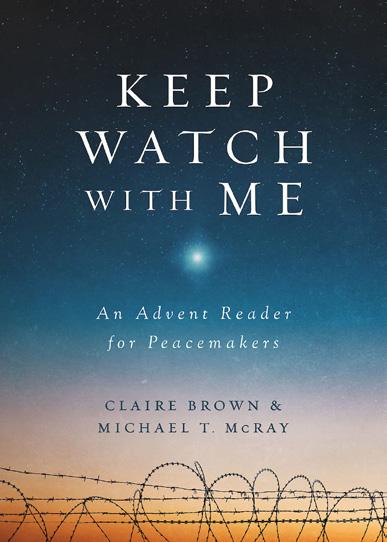
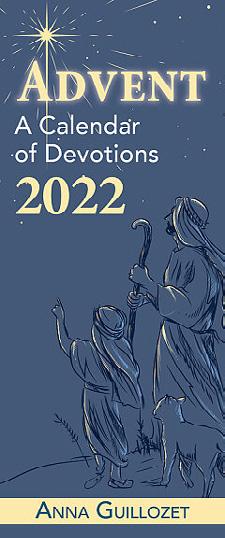
As the seasons turn, nature moves through cycles of activity and rest, waiting and emerging, birthing and dying.
www.mediacomeducation.org.au Ph: 08 8371 1399 Return to Contents22
Letter to the Editor
MediaCom produces and presents a vast range of studies, devotionals, and worship materials for our nourishment and nurture, our waiting and preparing for the story of God with us, born again in the story.
Mindfulness and Christian Spirituality: Making Space for God by Tim Stead
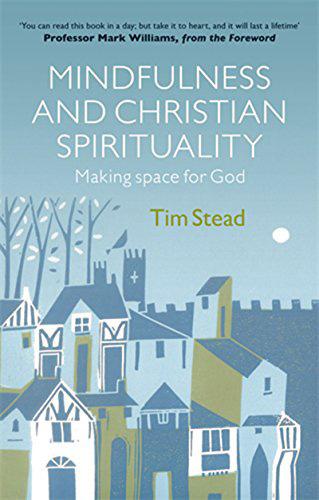
Of the books I have read on Mindfulness and Christianity, this is my favourite. Tim Stead is an Anglican minister in Oxford. He has a broad and deep understanding of the history and practice of Christian spirituality, as well as being an experienced teacher of Mindfulness. Stead explores Mindfulness, noting its roots in Buddhism, its adoption by psychology and its similarities and differences from Christian meditation. If you are looking for a guide to Mindfulness from a Christian perspective, a helpful book on Christian spirituality or a set of engaging and useful practices, this is a fine book. Stead makes good use of his own pilgrimage in faith and the impact of mindfulness on his well-being and the lives of those he teaches and to whom he ministers. This book has joined my ‘regular re-read list,’ and I practice many exercises from reading it — highly recommended.
Rev Philip Gardner
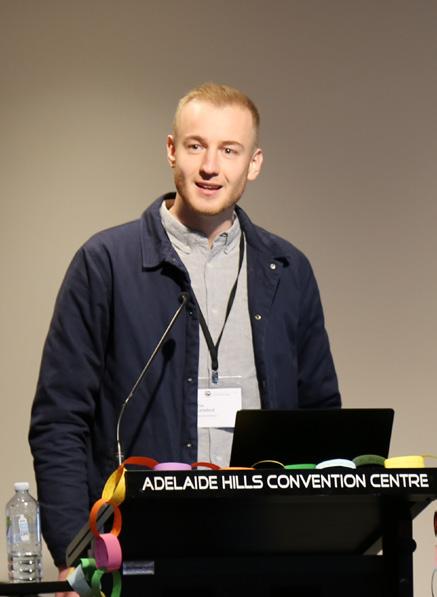
Many thanks to Tim Littleford for the Reflection in the August/September ‘New Times.’ Commenting on church trends he wrote, ‘We are facing a moment when something needs to change; an adapt or die moment.’ Sadly, with congregations closing or amalgamating, communities without churches could soon become the norm. But by defining church to be 'AS we gather' as well as 'WHERE we gather,' there's a way to keep church alive in communities. Disciples.
Local and networked, they would support each other to bring the Christian perspective into everyday community life. Gathering in homes or public spaces, they would have no need of a church building. This simple grass-roots Christianity is traditional too, as it pre-dates our current Institutional Church model. And as Missiologist JD Payne suggests, ‘What if, in our Father's economy, the primary way to accomplish the extraordinary is through the simple and the ordinary?’
Gaynor Hallows Morialta Uniting Church
Advent is waiting: enter the season paying attention, for light and hope are waiting, too; waiting to be born anew, in you!
Return to Contents 23
2023 Calendar
Each year the Uniting Church in South Australia provides congregations and individuals with lectionary readings and important dates related to the life of the church within its annual Calendar publication.
The 2023 Calendar is currently being prepared and is well advanced in design and content. The inspiration for the 2023 Calendar is a focus on the future, inspired by young people from across schools and colleges associated with the Uniting Church.

All congregations and organisations wishing to order printed calendars can do so by placing their orders between the dates of 24th October 2022 and 14th November 2022 (inclusive). Printed calendars will be priced at $6 each (however all orders received after the early bird ordering period – from 15th November 2022 onwards – will be priced at $10 each).
Calendars can be picked up from the Synod office (Level 2, 212 Pirie Street, Adelaide) from Monday, 21st November 2022 onwards. They may also be posted at an additional cost for postage and handling.
Orders must be placed using the Calendar order form which will be available via this link: https://ucasa.org.au/calendars/ Please note, orders must be paid for by a credit or debit card, as we do not have the capacity to issue invoices.
For more information or if you have any questions or queries please send them through via email only to the Engagement team at engagement@sa.uca.org.au.
Return to Contents 24
Placements News
Placements finalised as at 1st September 2022
Rev Janice McWhinney to Adare UC from 1 November 2022 Justin Gutteridge (MOP) to Salisbury UC from 1 August 2022
Rev David Williamson to ACHA - Memorial Hospital (0.5) from 1 November 2022
Vacant placements
The following is the list of vacant (or soon to be vacant) approved placements:
PROFILES AVAILABLE
Generate Presbytery
Balhannah UC (0.6) Clare UC Naracoorte UC Walkerville UC (Vacant 2023)
Presbytery of Southern SA
Glengowrie UC (0.5) (Vacant 2023) Marion Warradale (0.7) (Vacant May 2023)
Wimala Presbytery
Clayton Wesley UC - Expressions of interest to pgardner@sa.uca.org.au Croydon Park UC (0.3) Lefevre UC (0.4) Kimba UC (0.5) Para Vista (0.3) Scots Church Western Link (0.5) Woodville UC
Placements Across Two Presbyteries
Yorke Peninsula Regional Mission Minister - Full Time Yorke Peninsula Regional Pastoral Minister x2 Full or part time Expressions of interest to pgardner@sa.uca.org.au

PROFILES NOT YET AVAILABLE
Generate Presbytery
Wimala Presbytery
Berri UC / Barmera UC Brougham Place UC Port Augusta UAICC
Presbytery of Southern SA Unley UC (0.3) The Corner Uniting Church
Placements Across Two Presbyteries County Jervois (Generate and Wimala)
For more information about placements, please visit sa.uca.org.au

25
Return to Contents
MORIALTA CHARITABLE TRUST FUND

Morialta Charitable Trust Fund has been supporting disadvantaged children, young people and their families in South Australia through its annual program of distributions for 40 years. To enable the Fund to continue this support through community organisations in South Australia, Morialta Charitable Trust Fund seeks donations from the public. Donations of $2 and above are tax deductible and can be forwarded to the Morialta Charitable Trust Fund at PO Box 92, Crafers SA 5152
Deadline for the February/March 2023 edition: Friday, 13th January 2023
ISSN 0726-2612

New Times is the voice of Uniting Church in SA. Published bi-monthly, February through November, New Times represents the breadth, diversity and vision of Uniting Church members in South Australia. Articles and advertising do not necessarily reflect the views of the New Times Editorial team.

CLASSIFIED Send your letters to: engagement@sa.uca.org.au or GPO Box 2145, Adelaide 5001
Return to Contents 26

